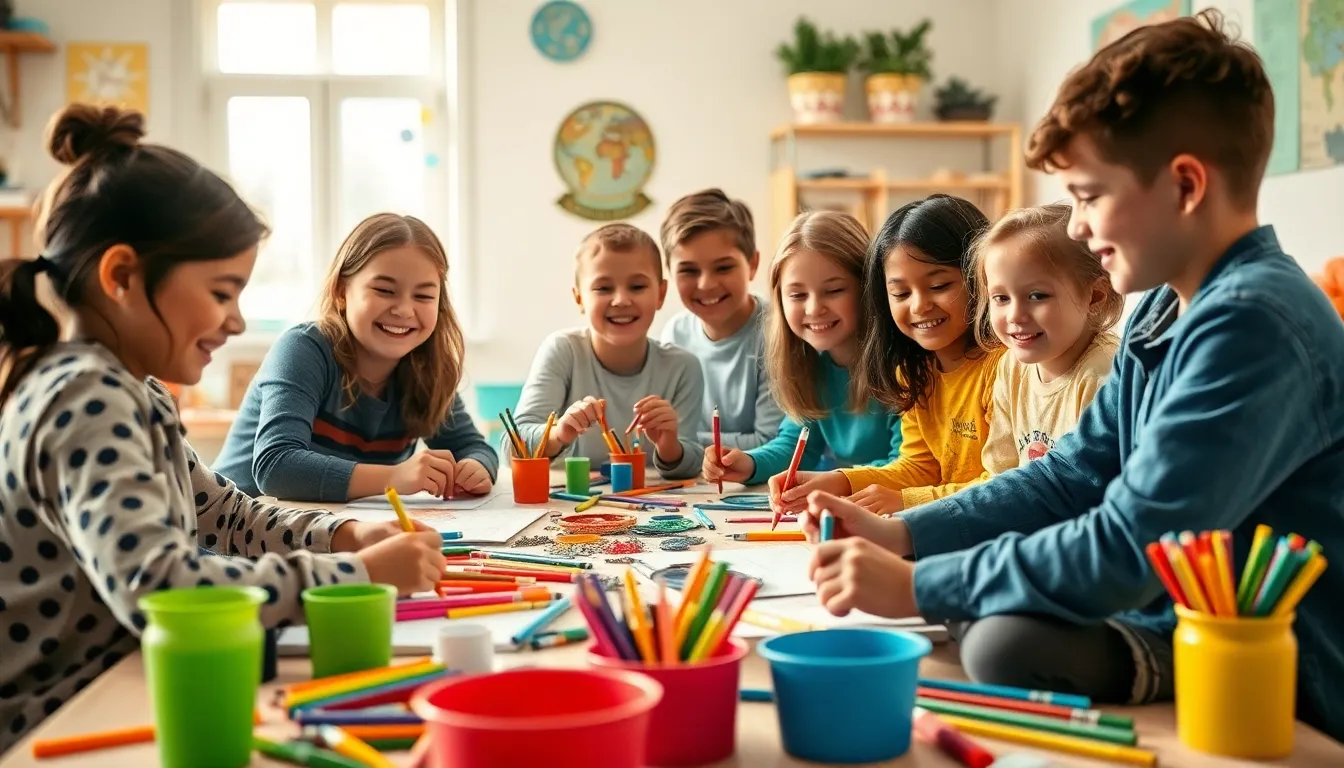In a world where the lunchroom is a battleground and the playground is a jungle, some might wonder how homeschoolers manage to socialize. Do they just sit around the dining room table debating the merits of algebra over cookies? Not quite! Homeschool socialization is a vibrant tapestry woven from playdates, co-ops, and community activities that would make any social butterfly jealous.
Contrary to popular belief, homeschooled kids aren’t holed up in their rooms with only their pet goldfish for company. They’re out there, engaging with peers and exploring the world in ways that can make traditional schoolers green with envy. From sports teams to art classes, homeschoolers are proving that socialization isn’t limited to the four walls of a classroom. So, let’s dive into the lively world of homeschool socialization and discover how these kids are mastering the art of making friends.
Table of Contents
ToggleUnderstanding Homeschool Socialization
Homeschool socialization encompasses the ways in which homeschooled children connect with peers and develop social skills. This process is crucial for their overall development and emotional well-being.
Definition and Importance
Socialization refers to the interaction with others that helps individuals learn societal norms and build relationships. It’s essential for homeschooled children to engage in varied activities, as these opportunities foster skill development, cooperation, and teamwork. Furthermore, participating in social environments prepares them for adult interactions and builds confidence. Homeschooled children often join community sports leagues or group classes where they encounter diverse perspectives and practices, showcasing the importance of socialization in nurturing well-rounded individuals.
Common Misconceptions
Many believe that homeschooled children lack socialization opportunities, but this assumption often overlooks their real experiences. Popular myths suggest that these children are lonely or socially awkward, yet research indicates that homeschooled children frequently engage in group activities and friendships. They often attend co-ops, volunteer events, and extracurricular programs, providing them with ample avenues for social interaction. Classroom dynamics seen in traditional settings aren’t the only means to develop social skills. Consequently, homeschooled children often enjoy rich, interactive social lives that can rival their traditionally schooled peers.
Benefits of Homeschool Socialization

Homeschool socialization provides numerous benefits, fostering connections and skills essential for children’s development. Engaging in various activities promotes strong social bonds among homeschooled children.
Tailored Social Experiences
Tailored experiences cater to individual needs, allowing children to engage in specific interests. For instance, families can choose co-ops or groups that focus on themes like science or art. Customizing these interactions means children can learn at their own pace and alongside peers who share similar hobbies. Encouragement from parents enhances confidence during these encounters, laying the groundwork for effective communication.
Diverse Social Interactions
Diverse interactions expose children to various social situations, helping them adapt to different contexts. For example, participating in community sports or art classes encourages teamwork and collaboration. Group activities promote social skills, such as conflict resolution and empathy, crucial in today’s society. Through playdates and extracurricular programs, homeschooled children often connect with peers from diverse backgrounds, enriching their social experiences significantly.
Challenges of Homeschool Socialization
Homeschool socialization presents distinct challenges that families often navigate. Limited peer interaction emerges as a primary concern, impacting children’s ability to form diverse relationships.
Limited Peer Interaction
Homeschooled children may experience limited peer interaction, especially when compared to their traditionally schooled counterparts. They often lack daily exposure to a large, varying group of peers. This can lead to difficulties in developing friendships in familiar environments like classrooms. Parents might find that arranging playdates or group activities becomes essential for ensuring social connections. These intentional efforts help mitigate isolation and create opportunities for friendships, yet they require time and planning. When families incorporate co-ops, extracurricular activities, and community events, more diverse interactions become possible, enriching children’s social experiences.
Overcoming Stereotypes
Stereotypes about homeschoolers frequently present obstacles to their socialization. Many hold misconceptions that homeschooled children are socially awkward or lack interaction. Overcoming these stereotypes involves actively demonstrating the rich social lives that many homeschooled children lead. Networking with local homeschool groups and participating in community sports leagues can effectively counter these myths. Such involvement offers diverse social experiences, allowing children to develop essential skills alongside peers. Engaging with the broader community not only broadens social circles but also creates shared experiences that challenge preconceived notions. As a result, addressing stereotypes helps foster a more accurate understanding of homeschool socialization.
Strategies for Effective Homeschool Socialization
Homeschool socialization involves various strategies to ensure children connect with peers and develop social skills. Multiple approaches encourage meaningful interactions.
Co-Ops and Group Activities
Co-ops provide structured environments for homeschooled children to learn and socialize. In these groups, children meet regularly for educational activities. Group classes often include art, science, and physical education, allowing peers to connect over shared interests. Skill-based workshops in co-ops enhance learning experiences while fostering friendships. Parents play an active role, organizing events that support networking and collaboration among families. Frequent interactions within co-ops clarify social dynamics, providing children with essential teamwork skills. Additional activities like field trips or community projects serve as platforms for creating lasting friendships.
Community Engagement Opportunities
Community engagement offers numerous avenues for homeschoolers to interact. Sports leagues involve kids in team-based activities that promote cooperation. Local art classes and music lessons provide outlets for creativity, encouraging social bonds among participants. Volunteering for community service helps homeschooled children develop empathy while making connections with diverse individuals. Participation in library programs and workshops exposes kids to new ideas and social settings. Parents can facilitate these opportunities by researching local offerings, ensuring children gain exposure to various age groups. Each engagement enriches their overall social experience, enhancing their ability to navigate different social landscapes.
Conclusion
Homeschool socialization is a multifaceted aspect of a child’s development that often defies common misconceptions. By participating in various activities and community events, homeschooled children can cultivate meaningful relationships and develop essential social skills.
The diverse opportunities for interaction ensure that these children are not only socially engaged but also well-equipped to navigate different environments. With parental involvement and a proactive approach to socialization, homeschooled kids can thrive in their social lives, often enjoying rich experiences that enhance their emotional well-being and personal growth.



